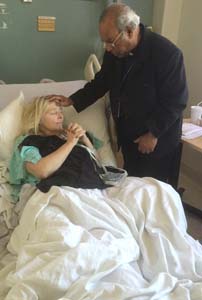Fr. Chacko Parekatt, SVD
Reflections on My Healing Ministry as a Hospital Chaplain
Fr. Chacko Parekatt, SVD, is a Divine Word Missionary from India. He entered formation when he was 18 years old in 1963. He was ordained to the priesthood in 1973. After working in India for 35 years, he is now in Canada ministering as a hospital chaplain. He previously shared his vocation story in hopes that others who are uncertain about their vocation may persevere.
When I landed in the United States in August 2008 with an assignment to the Chicago Province, it never came to my mind that I would be involved in hospital ministry in Canada. My three-year ministry with the sick and dying in two nursing homes in Memphis, Tennessee, USA, paved the way for my present ministry in two huge hospitals in Mississauga, Ontario, Canada. This is my fourth year of ministry in Canada and the Lord has blessed me with good health, enthusiasm and energy to carry on my ministry. I am residing at the Divine Word Missionaries’ Cristo Rei Parish at Mississauga and whenever possible, I also help our confreres in parish ministry.
The hospitals where I minister come under the same administration and they are known by name as Trillium Healthcare Partners. They have a good reputation of providing quality health care to all their patients. They are staffed by a variety of healthcare professionals. My ministry includes the administration of the sacraments, meeting with grieving family members of patients who pass away, counseling those who are in need of it, etc. From an organizational and managerial point of view, these hospitals are non-denominational. Spiritual care is given to each and every patient. There are chaplains who belong to other religious denominations. The spiritual care department works together as a team.
A chaplaincy program is founded on a sense of Christian Mission—reaching out to the sick and the dying with compassion and love. A chaplain has to learn how he or she is going to “be there” with patients, help them confront the truth in their lives, give them support, and sometimes help them make decisions. Sometimes I come across deeply religious patients who are able to handle their pain, their chronic illness or the death of a loved one with inner peace and tranquility. They are really an inspiration for me. More and more, I come to the understanding that patients can strengthen my faith.
Some patients like to tell their stories—stories about their families and about their illnesses. Some do not prefer to talk. In any case, the most important thing the chaplain has to do is “be present,” giving a compassionate ear. Touch is one of the most effective tools. Touch helps them feel that there is someone who really cares for them. Most of the time, what the patient really wants is someone to hear their moans and groans.

They have something to say and they just want someone to hear them rather than someone to try and tell them something. In addition, some hospital employees also like to visit chaplains when they come across some questions in their lives. This tells how important the role a chaplain is in a hospital setting.
Carl Jung, the founder of analytical psychology, once said that his patients got sick because they had severed their religious roots. He believed that if patients wanted to be healed, they need to renew their contacts with religion. At the same time, some argue for the substitution of psychology for theology in the pastoral care of the sick. I believe that we cannot have a complete separation between the two. It is good for chaplains to make use of psychological insights in their ministry to the sick. Also, it is good for the psychiatrists to make use of religious insights to heal their patients who suffer from emotional and mental health issues.
I would like to conclude this short article by thanking the Almighty for this wonderful opportunity He has given me at this age (I have passed seventy!) to touch the human heart in the most vulnerable period of people’s lives. It is mostly at the time of illness and at the moment of death that we cry for support and help. And it is at this moment, that we ministers can make the tremendous redemptive value of Jesus’ suffering present for others.
We'd Love to Hear From You
His mission is Our mission...Is it Yours? Let’s find out together!